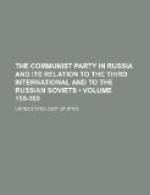|
This section contains 5,351 words (approx. 18 pages at 300 words per page) |

|
Lenin and other Soviet leaders understood that urbanization and industrialization were the key to the success of their endeavor. Marx himself had seen socialism as a system most suited to modern, Western European countries such as England, France, or Germany. In these countries, history had progressed the furthest on its logical, predictable path toward communism. Industrial workers living in large cities would carry out the revolution, and from the urban working class would come the leaders of the new socialist society.
But Russia remained a largely agricultural nation into the 1930s. Then, after World War II (1939-1945), rapid urbanization took place. The state built hundreds of new cities from the ground up and millions of Russian farmers left the countryside to take up new jobs as factory workers. Russia did not reach a majority urban population until the 1960s. By the mid-...
|
This section contains 5,351 words (approx. 18 pages at 300 words per page) |

|




